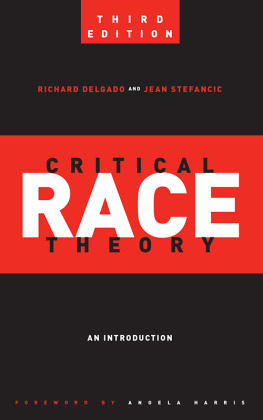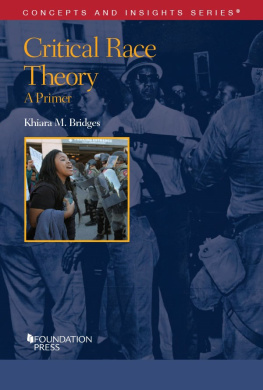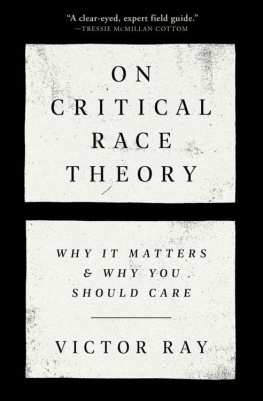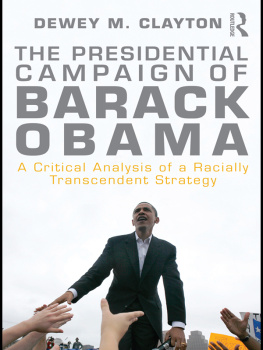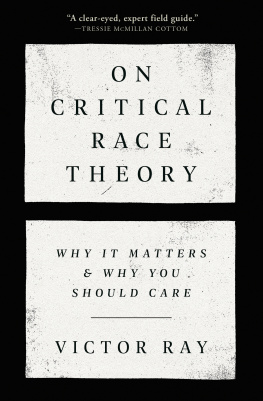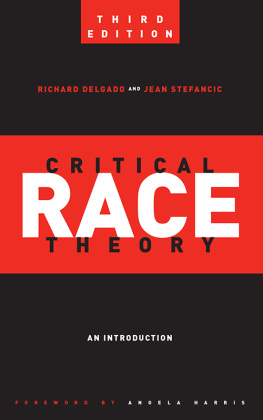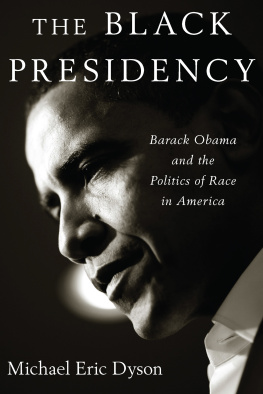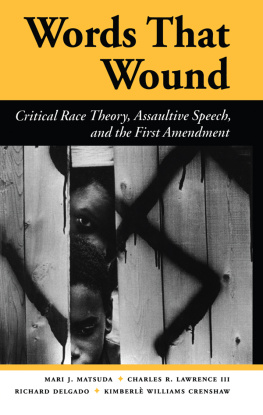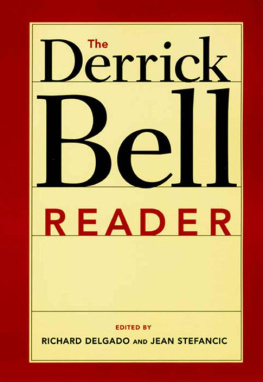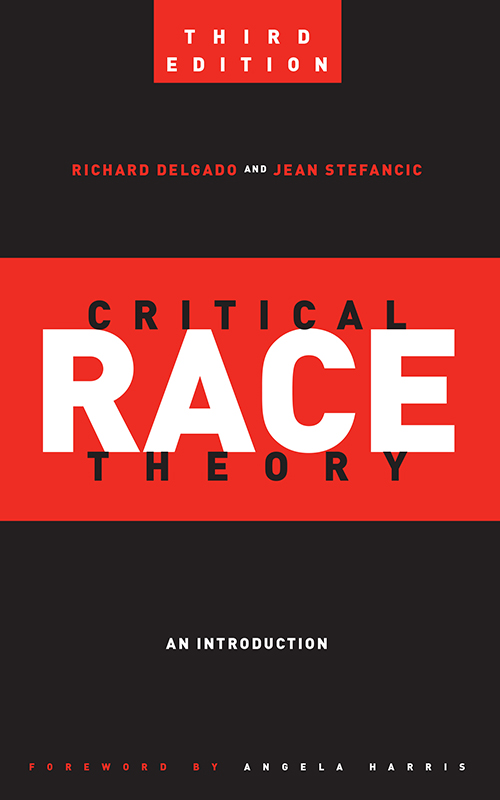
Critical Race Theory
CRITICAL AMERICA
General Editors: Richard Delgado and Jean Stefancic
Recent titles in the Critical America series include:
The First Amendment in Cross-Cultural Perspective: A Comparative Legal Analysis of the Freedom of Speech
Ronald J. Krotoszynski, Jr.
Feminist Legal Theory: A Primer
Nancy Levit and Robert R. M. Verchick
The Emergence of Mexican America: Recovering Stories of Mexican Peoplehood in U.S. Culture
John-Michael Rivera
Law and Class in America: Trends since the Cold War
Edited by Paul D. Carrington and Trina Jones
The Sense of Justice: Empathy in Law and Punishment
Markus Dirk Dubber
No Seat at the Table: How Corporate Governance and Law Keep Women Out of the Boardroom
Douglas M. Branson
White by Law: The Legal Construction of Race, Revised Edition
Ian Haney Lpez
Opening the Floodgates: Why America Needs to Rethink Its Borders and Immigration Laws
Kevin R. Johnson
The Reproductive Rights Reader: Law, Medicine, and the Construction of Motherhood
Edited by Nancy Ehrenreich
Chicano Students and the Courts: The Mexican American Legal Struggle for Educational Equality
Richard R. Valencia
Whitewashed: Americas Invisible Middle Eastern Minority
John Tehranian
American Exceptionalism and International Order
Natsu Taylor Saito
Critical Race Theory: An Introduction, Third Edition
Richard Delgado and Jean Stefancic
For a complete list of titles in the series, please visit the New York University Press website at www.nyupress.org.
Critical Race Theory
An Introduction
THIRD EDITION
Richard Delgado and Jean Stefancic
FOREWORD BY ANGELA HARRIS

NEW YORK UNIVERSITY PRESS
New York
NEW YORK UNIVERSITY PRESS
New York
www.nyupress.org
2017 by New York University
All rights reserved
References to Internet websites (URLs) were accurate at the time of writing. Neither the author nor New York University Press is responsible for URLs that may have expired or changed since the manuscript was prepared.
Library of Congress Cataloging-in-Publication Data
Names: Delgado, Richard, author. | Stefancic, Jean, author.
Title: Critical race theory : an introduction / Richard Delgado and Jean Stefancic ; foreword by Angela Harris.
Description: Third edition. | New York : New York University Press, [2017] | Includes bibliographical references and index.
Identifiers: LCCN 2016047077| ISBN 9781479846368 (cl : alk. paper) | ISBN 9781479802760 (pb : alk. paper) | ISBN 9781479851393 (ebook)
Subjects: LCSH: Race discriminationLaw and legislationUnited States. | Critical legal studiesUnited States. | United StatesRace relationsPhilosophy.
Classification: LCC KF4755 .D454 2017 | DDC 342.7308/73dc23
LC record available at https://lccn.loc.gov/2016047077
Some people see things as they are and say, why? I dream things that never were and say, why not?
R OBERT F . K ENNEDY , quoting George Bernard Shaw
In order to get beyond racism, we must first take account of race. There is no other way.
J USTICE H ARRY B LACKMUN
Contents
ANGELA HARRIS
In 1982 I was a graduate student in social science at the University of Chicago. I lived at International House, among a vibrant community of American students from African American, Latino/a, South Asian, and other backgrounds, as well as foreign students from Asia, Europe, Africa, and the Americas. We protested and picketed over sanctions for the South African apartheid regime. We saw Michael Jackson moonwalking for the first time on television. Our black male friends got stopped by the police for looking like members of the impoverished African American community that surrounded Hyde Park. We read books in which feminists attacked Freud and Third World women talked back to First World pieties. And we fought with the university administration over our demands for more programs, more resources, and more support for students of color on campus.
In 1983 I was a first-year law student at the University of Chicago. In my entering class of roughly 180 students, there were four African American students, including myself; one Asian American student; and two Latinos. All of our professors were white, and all but two were male.
Even more disorienting, however, than mere demographics was the fact that the lively discourse on racial-ethnic relations, both domestic and international, was gone. None of my professors talked about race or ethnicity; it was apparently irrelevant to the law. None of my professors in the first year talked about feminism or the concerns of women, either. These concerns were also, apparently, irrelevant. Nowhere, in fact, did the cases and materials we read address concerns of group inequality, sexual difference, or cultural identity. There was only one Law, a law that in its universal majesty applied to everyone without regard to race, color, gender, or creed.
Disoriented and unsure of ourselves, a few of us felt that something was profoundly missing in our education, though we could not articulate what the missing something was. We went outside the classroom to look for it. Some of us went to work for the Mandel Legal Aid Clinic. Some of us successfully agitated to get Professor Catharine MacKinnon, the pathbreaking feminist legal scholar, invited to speak (though not invited to join the faculty). Some of us even succeeded in getting permission for Professor Mary Becker to teach a seminar in feminist jurisprudence (though the dean asked us, somewhat bewilderedly, whether men would be excluded from the reading list). In reading groups we began to explore the literature of critical legal studies. But there seemed to be no critical literature on race and the law.
There was, of course, law that had a lot to do with the lives of some communities of color: poverty law, welfare law, criminal law, immigration law. But there was, seemingly, no language in which to embark on a race-based, systematic critique of legal reasoning and legal institutions themselves. As first-year, then second-year, then third-year law students, we had no inkling of the struggles going on at Harvard Law School over the work and teachings of Derrick Bell or of the few scholarsone coauthor of this book among themwho had begun to apply the tools of critical theory to the law. We finished our legal educations never having found a place where the sophisticated discourse of racial critique in which we lived our everyday lives could enter the legal canon.
Three years after I got my law degree, in the summer of 1989, I was a first-year law teacher invited to attend the first-ever workshop on something called critical race theory, to be held at the St. Benedict Center in Madison, Wisconsin. At that workshop, I discovered what had been missing for me as a student. I met some of the people who, by then, had begun to be recognized across the nation as major intellectual figures: Derrick Bell, Kimberl Crenshaw, Richard Delgado, Mari Matsuda, Patricia Williams. And I discovered a community of scholars who were inventing a language and creating a literature that was unlike anything I had read for class in three years of law school.
As we enter the twenty-first century, critical race theory is no longer new, but it continues to grow and thrive. The community has expanded: scholars not only from the United States but from countries including Canada, Australia, England, India, and Spain now work within the discipline of critical race theory. The literature has grown in breadth and depth: as this book indicates, not only race-crits but also queer-crits, LatCrits, and critical race feminists seek to reveal and challenge the practices of subordination facilitated and permitted by legal discourse and legal institutions. And, finally, the audience has grown. Critical race theory has exploded from a narrow subspecialty of jurisprudence chiefly of interest to academic lawyers into a literature read in departments of education, cultural studies, English, sociology, comparative literature, political science, history, and anthropology around the country.
Next page
